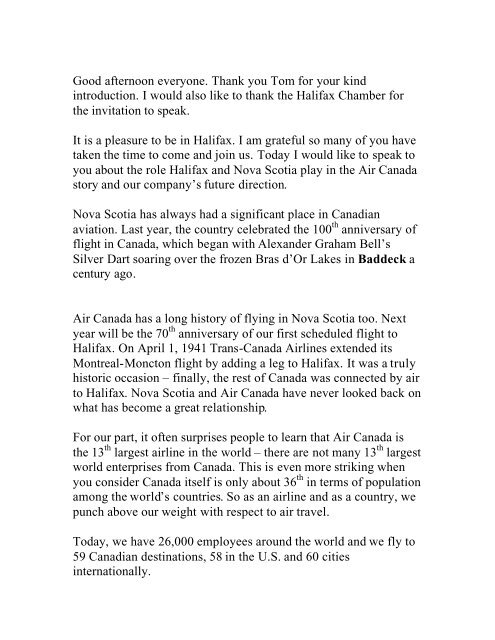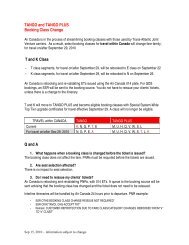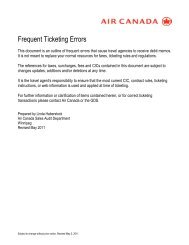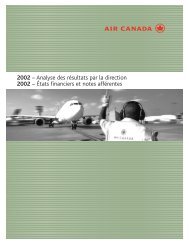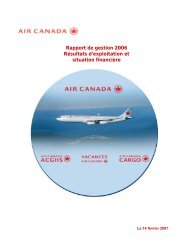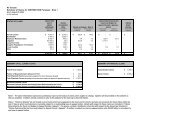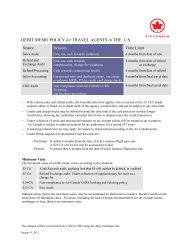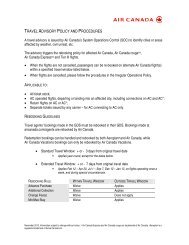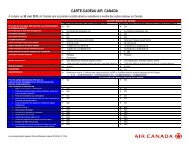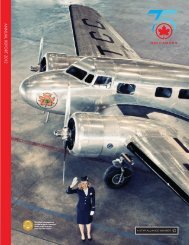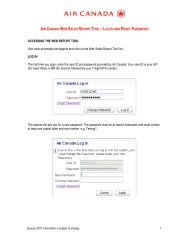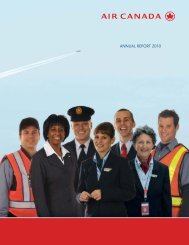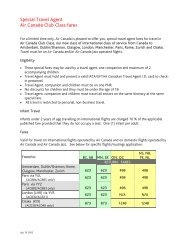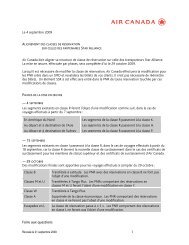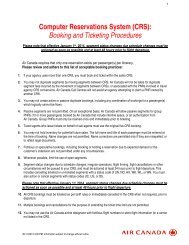Good afternoon everyone. Thank you Tom for your kind ... - Air Canada
Good afternoon everyone. Thank you Tom for your kind ... - Air Canada
Good afternoon everyone. Thank you Tom for your kind ... - Air Canada
You also want an ePaper? Increase the reach of your titles
YUMPU automatically turns print PDFs into web optimized ePapers that Google loves.
we have been growing our business steadily here in Nova Scotiaand I want to say a sincere thank <strong>you</strong> to all of our loyal supporters.Another important element of our business is <strong>Air</strong> <strong>Canada</strong> Cargo.We carried about 5.3 million kilograms of cargo out of Halifax lastyear, with seafood accounting <strong>for</strong> the largest portion. Most of thatis lobster with some flights carrying up to 30,000 kilograms ofthem; but tuna is popular too and we carried 230,000 kilos of thatlast year, enough to fill nearly 1.5 million cans. This business hasbeen growing since the early 1960s when fishermen would pull upin their pickups and hand us cardboard boxes of lobster and weintend to continue expanding and diversifying, especially with socalled “hard cargo” such as parts <strong>for</strong> the oil and gas industry.But <strong>Air</strong> <strong>Canada</strong>’s presence in Halifax and Nova Scotia is aboutmuch more than filling seats on planes or cargo containers.<strong>Air</strong> <strong>Canada</strong> employs over 450 people in Halifax .We also spend$133 million annually in the province on goods and services. Andthe spin-off annual economic impact of <strong>Air</strong> <strong>Canada</strong> in Nova Scotiaamounts to over half a billion dollars. So we mean as much to thiscommunity as it does to us – a lot.In addition, Jazz’s head office is located in Halifax and it employsmore than 700 people, making it one of the province’s largestemployers. Jazz has a pilot and flight attendant base, amaintenance base, its system-wide operational control centre and alarge group of management and administrative staff located here. Itspends $14 million a year on vendors in Nova Scotia, making it asignificant contributor to the provincial economy.Although Jazz has been a separate company since 2004 and has itsown management team, board of directors and stock listing, <strong>Air</strong><strong>Canada</strong> has a long term partnership with Jazz that is enshrined inour Capacity Purchase Agreement.
And while today we contract most of Jazz’s flying, under theleadership of Joe Randall, Jazz has evolved into a dynamic airlinein its own right and is now beginning to embark on somediversification which should lower <strong>Air</strong> <strong>Canada</strong>’s unit costs.This month, Jazz signaled the next stage in its development byconfirming it will purchase 15 new Bombardier Q-400 aircraftwhich will be used <strong>for</strong> <strong>Air</strong> <strong>Canada</strong> flying.That <strong>Air</strong> <strong>Canada</strong> and Jazz have been able to grow and succeed isall the more noteworthy when one looks at our industry. Theairline industry is one of the most challenging in the world.There is intense competition, high costs, it is hyper-sensitive toeconomic change and it can be thrown into disarray by badweather, volcanoes, earthquakes, underwear bombers, pandemicsand conflict happening anywhere in the world. This is not likeother industries.Last year, with the economic downturn, the global airline industrysaw the worst drop in revenue since the Second World War. TheInternational <strong>Air</strong> Transport Association estimates the globalindustry lost $10 billion in 2009 and, despite signs of recovery,may lose another $2.8 billion this year.<strong>Air</strong> <strong>Canada</strong> is not immune to these effects and there have beendifficult times.However, with the great ef<strong>for</strong>t of our employees, partners, andfinanciers in 2009, we have now stabilized our company – in factwe even raised $250 million in new equity last year despite turmoilin the stock markets – and we are now focused on the future.
$270 million target <strong>for</strong> 2010, after exceeding last year’s $50million target by 40 per cent.Importantly, we are doing this without compromising the customerexperience or through employee reductions.Such a trans<strong>for</strong>mation has to be about much more than simply costreduction. It means technology. It means different processes. Itmeans new products. It means innovation and creativity.We have to play to our strengths. We are not a low-cost carrier –we are a 72 year-old full-service airline with a great history, a greatproduct plat<strong>for</strong>m, a great network. . We are trans<strong>for</strong>ming the waywe engage with our customers, with particular emphasis on ourpremium business travellers, and this is our second priority.We are doing this through industry leading products. Through newcommunication tools. Through face-to-face meetings with our toptier customers so we can listen and improve. We have met across<strong>Canada</strong> with our Super Elite customers including here in Halifaxthis morning. And through a more engaged front-line employeework<strong>for</strong>ce intent on showing what we can do.We know that no one owes us a living – we are not entitled to <strong>you</strong>rbusiness – we must earn it.Our Lie-flat suites in international business class lead the industry.Our top of the line in-flight entertainment system on the back ofeach seat shows films that are still in theatres. Our Maple LeafLounges and our Concierge Program make the airport experiencesignificantly more pleasant <strong>for</strong> our most frequent travelers.Aeroplan consistently is amongst the highest ranked of airlinerewards programs worldwide.
We were also the first North American airline to introduce popularnew IT services <strong>for</strong> customers in the <strong>for</strong>m of Apple and Blackberryapplications with automatic flight notification and self-rebookingtools so people can manage their own travel as they like.Conversely, we admitted straight up that certain irritants werebothering customers. We eliminated the call centre fee. Weincreased the availability of Aeroplan reward seats.We allowed small pets back in the cabin. We improved our SuperElite members’ access to revenue seats. And we reached out to thetravel trade community to restore commissions on some of ourlower fare categories.While our ef<strong>for</strong>t to re-engage customers is still very much a workin progress, I was extremely pleased late last year when the mostfrequent travelers in the industry, including our own customers,recognized what we are achieving. In late 2009, we won a series ofprestigious awards from international magazines that are, in effect,the Academy Awards of our industry, based on extensive surveysof many different carriers.Business Traveler magazine, with 500,000 readers, and teneditions published globally, gave <strong>Air</strong> <strong>Canada</strong> more awards thanany other carrier in the world, including• the Best Flight Attendants in North America;• the Best In-flight Services in North America;• the Best Business Class among North American carriers;• Best North American <strong>Air</strong>line <strong>for</strong> International Travel.A survey of 25,000 readers of the equally respected GlobalTraveler magazine found <strong>Air</strong> <strong>Canada</strong> to be the Best <strong>Air</strong>line in<strong>Canada</strong> and the Best <strong>Air</strong>line in North America.
Customers publicly praised our London agents in a column by TheToronto Star’s travel editor, who himself was stranded in London.“They haven’t been pretty good, they’ve been fabulous,” he quoteda customer saying.There are hundreds of stories like this – relating to the VancouverOlympics, humanitarian relief in Haiti and ChileThe fourth element of our trans<strong>for</strong>mation entails building on ourposition as one of the world’s leading international carriers. As Isaid, <strong>Air</strong> <strong>Canada</strong> is the 13th largest airline in the world.There are a number of reasons <strong>for</strong> this. We benefit from <strong>Canada</strong>’sexcellent geographic position, we have a vast network underpinnedby an array of bilateral authorities to fly to other countries, and,more than this, we are a founding partner of the 26-member StarAlliance, the largest global airline network. It enables us toseamlessly connect passengers with carriers that fly to 1,100airports in 175 countries and this connecting traffic drives growth.For example, Brussels <strong>Air</strong>lines’ admission to Star Alliance lastyear made it attractive <strong>for</strong> <strong>Air</strong> <strong>Canada</strong> to begin flying to Brussels.This opened not only another European gateway <strong>for</strong> customersespecially throughout France, but also a convenient connectingpoint <strong>for</strong> travel between <strong>Canada</strong> and Africa, which is well servedby Brussels <strong>Air</strong>lines through their extensive African network.For Halifax, the Star Alliance makes <strong>you</strong>r city attractive <strong>for</strong> othermember carriers. Passengers can flow seamlessly between <strong>Air</strong><strong>Canada</strong> and Star members, and frequent flyer miles are transferableamong Star Alliance partners, so customers can collect and redeemAeroplan miles on our partners or use our partners’ miles on <strong>Air</strong><strong>Canada</strong> flights. This includes United <strong>Air</strong>lines’ flights to
Washington and Chicago, Continental <strong>Air</strong>lines’ flight to Newarkand U.S. <strong>Air</strong>ways’ route to Philadelphia.In addition to Star, we have joined with Lufthansa, United <strong>Air</strong>linesand Continental <strong>Air</strong>lines to <strong>for</strong>m Atlantic-Plus-Plus, a venturethrough which each carrier sells seats on the other as if we wereone large airline with a single network. This results in new routesand city-pairings as we integrate our route maps to connect trafficflowing between the four partners.Since last year we have already added or announced new service toGeneva, Rome, Brussels, Athens and Barcelona that willstrengthen our European flagship routes of London, Paris andFrankfurt. In March, we launched our first Calgary-Narita flightand next month we will launch St. John’s-London service. I havejust returned from Brazil <strong>for</strong> an event in which TAM <strong>for</strong>mallyjoined Star Alliance as its 27 th member airline. TAM’s joining Staralso presents us with huge opportunities.Success, however, is rarely achieved alone. It takes strongpartnerships to thrive and I am pleased to tell <strong>you</strong> we have a greatpartner in the Halifax International <strong>Air</strong>port Authority, under theleadership of <strong>Tom</strong> Ruth, and the Halifax Stanfield International<strong>Air</strong>port.<strong>Tom</strong> and his team embody the notion of partnership and we haveworked with them in marketing and building routes, such asHalifax-Gander and Halifax-Boston flights that we could notdevelop alone. The ultimate beneficiary has been Halifax and NovaScotia, who enjoy more travel options <strong>for</strong> business, tourism andleisure as a result.
In many ways, <strong>you</strong>r airport authority exemplifies the “Just Do It”approach I am trying to instill in <strong>Air</strong> <strong>Canada</strong>. The cooperation andthe support we get from the authority shows they understand thechallenges and the opportunities airlines represent <strong>for</strong> acommunity. [ Expand on what it takes <strong>for</strong> an <strong>Air</strong>port to build aGlobal Champion in <strong>Air</strong> <strong>Canada</strong> – good infrastructure includingaccess, efficient connecting and transit processes and competitivecosts]To survive, thrive and further grow, airlines cannot be the cashcow that is milked dry by fees and charges that are added ontotickets by governments. Hampering the airline industry simplyhampers economic growth. Among other things, there is GST,PST, the recently hiked security surcharge, federal and oftenprovincial fuel excise taxes, airport improvement fees andnavigation charges.Looming above all is federal airport rent, collected by airports onbehalf of the Government – something no other industrializedcountry collects. Although <strong>Canada</strong> privatized its airports in 1992,Ottawa continues to collect more than $300 million annually inrent <strong>for</strong> these facilities <strong>for</strong> general revenue. Due to these charges itcosts <strong>Air</strong> <strong>Canada</strong> an average $3,400 to land an <strong>Air</strong>bus A320 at<strong>Canada</strong>’s largest airports versus an average of only $1,650 at majorU.S. airports. More than double. How can one expect to compete,to globally compete <strong>for</strong> hubs, and traffic by paying double thecosts.In Halifax alone, last year, the federal government collected $3.2million in rent from the Halifax International <strong>Air</strong>port – indirectlyfrom passengers as airlines have to pass this charge on. This year,that amount will increase to $4.2 million and it is projected to riseto $5 million by 2014. This adds extra costs to tickets not used to
improve airport infrastructure, improve passenger flows orpassenger services.Another area of government policy that is important to Canadiancarriers is liberalization of air travel. The federal government is tobe commended <strong>for</strong> the approach it has taken over the years towardliberalizing the aviation market. <strong>Air</strong> <strong>Canada</strong> has grown to the 13 thlargest airline in the world in large part because of its internationalflying.We welcome such liberalization where it makes sense, where therespective market sizes mandate it and where there are benefits <strong>for</strong>Canadians. To give <strong>you</strong> an example, <strong>Canada</strong> opened its skies toU.S. carriers on a reciprocal basis in 1995 and since then we havebecome the largest single airline in the highly competitive UStransborder market, serving nearly 60 destinations in the U.S – themost aggressively competitive air travel market in the world.On the <strong>Canada</strong>-U.K. market, there are 10 players and <strong>Air</strong> <strong>Canada</strong>now offers up to 12 flights daily – including daily 767 service fromHalifax this summer. We have welcomed liberalization elsewheretoo, most recently with 27 countries within the European Union.<strong>Air</strong> <strong>Canada</strong> has what it takes to become a Global Champion andthe country will benefit because there is a direct and strongcorrelation between air connectivity and economic growth. We areseizing opportunities, innovating with new products both on andoff our aircraft, we are expanding both organically and through ourglobal partners, and we have a clear vision <strong>for</strong> the future of ourcompany.
It has been a pleasure to speak with <strong>you</strong> this <strong>afternoon</strong>. I look<strong>for</strong>ward to sharing many more years of success with the Halifaxand Nova Scotia business community and to keep finding ways tobuild on each other’s strengths.<strong>Thank</strong> <strong>you</strong>


